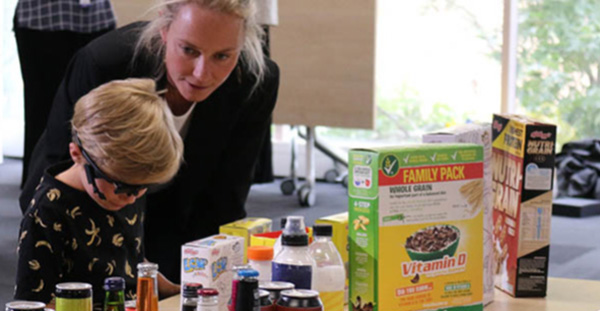A revolutionary new method to monitor how products that increase the risk of cancer are marketed to children, is one of five research projects funded under Cancer Council Victoria’s $2.3 million Venture Grants research program.
The research team are creating a world-first, automated approach to monitoring children’s exposure to, and engagement with, the advertising of products known to increase risk of cancer (alcohol, tobacco and junk food). This project brings together experts across public health, policy, complex systems and artificial intelligence.
Last year, a WHO-UNICEF-Lancet Commission called for action to regulate commercial harm to children, citing ‘they are enormously exposed to advertising from business, whose marketing techniques exploit their developmental vulnerability and whose products can harm their health and wellbeing.’
Lead researcher, Associate Professor Kathryn Backholer of Deakin University’s Institute for Health Transformation, said with the rise of digital and social media platforms, children are being exposed to high volumes of marketing of alcohol, e-cigarettes and junk food, and that this marketing is personalised and more targeted by industry than ever before.
“Essentially, we are creating an urgently needed low-resource tool, that will provide a rigorous, and ethically sound way of monitoring exposure to harmful advertising in both physical and digital environments. The tool will use cutting-edge AI technologies and eye tracking capabilities, which have been developed for other applications, such as Australian Defence and elite sports behavioural psychology. Understanding how children engage with various forms of advertising and marketing strategies will support future policies to effectively protect children and the wider public health.”

In the first twelve months of this project, Associate Professor Kathryn Backholer and her team developed a mobile app, capable of crowdsourcing images of unhealthy advertisements. The app can be used by anyone, anywhere at any time. The app is linked to a back-end system where coded images are checked and then imported into an image library. The app will also be used by the research team as a mobile capture and image coding tool, which will also assist in ongoing development of the image library.
The app is currently being pilot tested with a cohort of parents who are collecting images of unhealthy advertisements on their children’s routes to school. This study will highlight where and how the app can be refined to ensure it is user friendly and will demonstrate its utility as a data collection tool.
To date, almost 12,000 images have been added to the image library and tagged with relevant information (e.g. an image of a burger and soft drink would include a tag for ‘fat-food’ and ‘sugar sweetened beverage’). A large, comprehensive and varied image library is essential for algorithm training so we can automatically identify and detect unhealthy food advertisements in any type of captured footage (internet, tv etc).
Two subsets of the image library have been created – training dataset and validation dataset. In the training dataset, the system has been trained to detect images The validation dataset was created to evaluate the performance of the algorithm after training.
Additional funding was secured from Deakin University to adapt iPupilX hardware (glasses with a camera and eye-tracking device) that can be worn by children. A small pilot study has commenced to test if the use of iPupilX is a feasible and appropriate device to collect data on children’s exposure to unhealthy marketing as they go about their daily lives.
“Venture Grants allows researchers to conduct blue-sky research that would not be funded elsewhere and to generate the necessary data to secure nationally competitive grants to scale up the research. It is this kind of funding that allows scientific breakthroughs to occur”, said A/Prof Backholer.
Protecting children from harmful exposure to unhealthy marketing is crucial to the prevention of cancer. Quantification of unhealthy advertising exposure to children and an understanding of how children engage with various forms of advertising and marketing strategies will support the formulation of effective regulatory action to protect children from economic exploitation of products known to increase the risk of cancer.
“The Picchi Brothers Foundation Inc are committed to supporting the Cancer Council Venture Grants program. The Venture Grants projects assist innovative researchers with their courageous ideas that have the potential to revolutionise the way cancer is detected, treated and managed.
The Picchi Brothers Board members thoroughly enjoy their involvement in these exciting research programs that are at the forefront of high-risk, high-reward cancer research.” - Lyn Parkin, Picchi Brothers Foundation Inc.
The Venture Grants research program is designed to support innovative researchers with courageous ideas who would not be able to attract conventional funding.
Launched in 2006, previous rounds of Venture Grants have been successful incubators of early research ideas, allowing projects to develop from proof of concept into mature projects eligible for conventional funding.